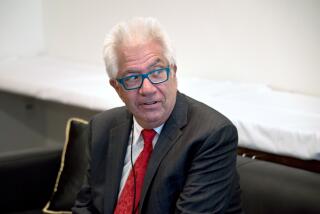Richard Scammon; Elections Expert, Political Advisor
- Share via
WASHINGTON — Richard Scammon, a political scientist and elections analyst who had been a government official and advisor to presidents, died Friday in Gaithersburg, Md. He had Alzheimer’s disease and was 85.
Scammon worked for the Army and State departments before serving from 1961 to 1964 as head of the Commerce Department’s Census Bureau. In that post, he was a personal advisor to Presidents John F. Kennedy and Lyndon B. Johnson on public opinion and political trends.
In 1955, Scammon founded the Elections Research Center, a Washington nonprofit organization that he directed until it closed in 1995. From 1965 to 1989, he also was a senior consultant to NBC News.
He was the editor of a series of landmark works on elections, “America Votes,” which interpreted the results of the country’s most recent elections, and also edited the two-volume “America at the Polls,” an election summary covering 1920 through 1996.
In 1966, Scammon and Ben Wattenberg collaborated on a book, “This USA: An Unexpected Family Portrait of 194,067,296 Americans Drawn From the Census.” Writing during a time marked by civil rights activism, urban unrest and Vietnam War protests, they asserted “that the United States is entering a Golden Age, that we have achieved a better America.”
But perhaps Scammon will be best remembered for the 1970 book he wrote with Wattenberg, “The Real Majority.” That book warned the then-leftward-leaning Democratic Party that it was courting disaster with its growing lack of attention to the problems, values and aspirations of that middle-aged, middle-class, middle-of-the-road section of the country that was becoming known as “Middle America.”
The book warned the Democrats that to remain the country’s majority party they would have to address such social issues as crime and busing. They reported that Americans were beginning to view social issues as just as important as economic issues, and that such phrases as “law and order” should not be contemptuously dismissed as racist “code words.”
Their book was at first denounced by some as little more than unbelievable Republican propaganda, but it has become a landmark example of the art of translating sets of confusing numbers into something like a revealing mass portrait in essay form.
In 1963 and 1964, Scammon headed the Presidential Commission on Regulation and Voting Participation, in which he was highly critical of the nation’s election laws, many of which he found “unreasonable, unfair and outmoded.”
Over the years, he had served as an election observer, beginning with the Soviet Union in 1958 and then in such countries as the Dominican Republic and Vietnam before concluding with El Salvador in 1984.
Richard Montgomery Scammon was born in Minneapolis on July 17, 1915. He was a 1935 political science graduate of the University of Minnesota, and he received a master’s degree in the same subject at the University of Michigan. He also studied at the London School of Economics in the late 1930s.
Before World War II, he spent two years as a research secretary with the radio office of “The Roundtable” program at the University of Chicago. During World War II, he served with the Army in Europe and attained the rank of captain.
Scammon was a member of the American Political Science Assn., the American Academy of Political and Social Science, the American Academy of Political Sciences and the Cosmos Club.
Survivors include his wife of 49 years, Mary Allen Scammon; a daughter, Anne Valerie; and a sister.
More to Read
Get the L.A. Times Politics newsletter
Deeply reported insights into legislation, politics and policy from Sacramento, Washington and beyond. In your inbox twice per week.
You may occasionally receive promotional content from the Los Angeles Times.










